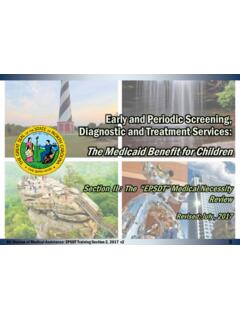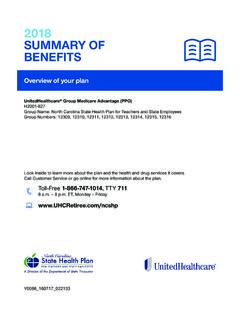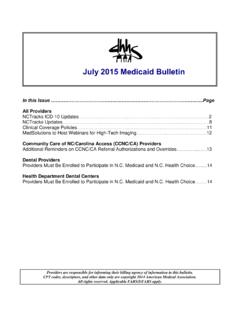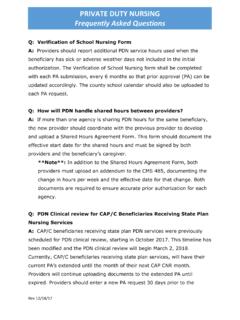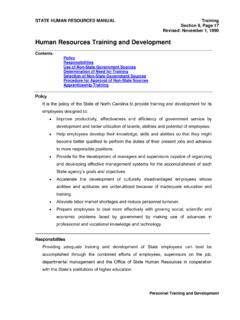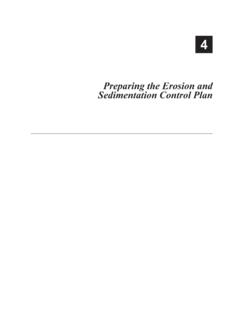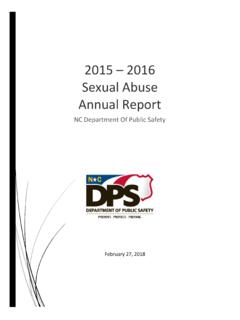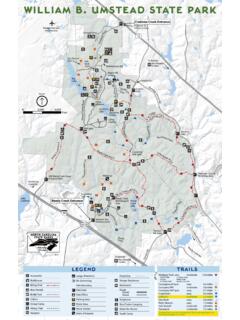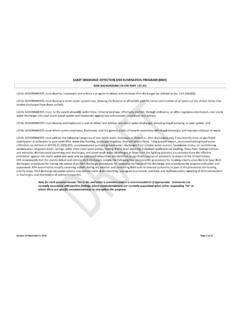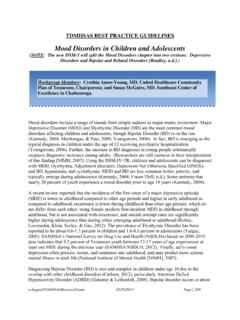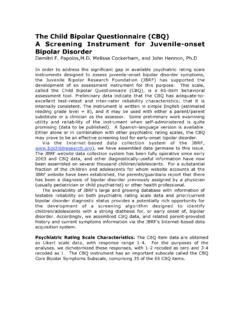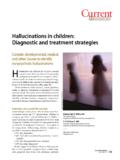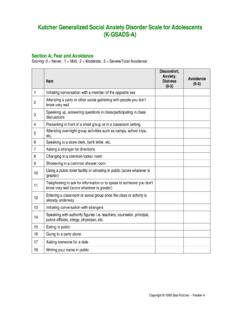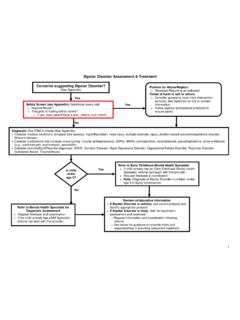Transcription of Psychotropic Medications in Children and Adolescents ...
1 Psychotropic Medications in Children and Adolescents : Guide for Use and Monitoring ( ) Page 1 Psychotropic Medications in Children and Adolescents : Guide for Use and Monitoring This document was developed by Community Care of North Carolina with the assistance of the Medication Management Workgroup of the Fostering Health NC initiative, a project of the NC Pediatric Society ( ). The information contained in this guide is not intended to substitute or act as medical advice. If you have any questions about a medication prescribed to a child or adolescent in your care, contact the prescriber or a licensed medical professional.
2 Definition of Psychotropic Medication: Medication used in the treatment of mental illnesses and capable of affecting the mind, emotions, and behavior. Use of this Information: The tables below offer information for care managers and foster and resource parents to use when they want to learn more about certain Psychotropic Medications . Specific information is outlined including the therapeutic class, brand and generic names, FDA approved uses, common evidence-based uses, potential side effects, and medication-specific safety/effectiveness monitoring necessary when prescribed to a child or adolescent .
3 Because few Medications have been FDA approved for use in Children 5 years of age and under, there is a column in the table that lists the FDA approved status and age ranges for the approved uses of each medication. This guide also provides a color-coded quick reference guide for each medication (Appendix A), questions that a foster or resource parent should ask a prescriber (Appendix B), and a glossary of terms (Appendix C). Information provided in this document is based on Psychotropic Medication Utilization Parameters for Children and Youth in Foster Care , 5th Version- Texas Dept.
4 Of FPS; Lexicomp. Table of Contents: Page(s): ADHD Medications 2 Depression & Anxiety Medications 3-4 Second Generation Antipsychotic Medications 5-6 Mood Stabilizer Medications 7-9 Sleep Medications 10-11 Appendix A: Color-Coded Psychotropic Medications 12-13 Appendix B: Questions to Ask the Prescriber 14 Appendix C: Glossary of Terms 15-16 Author: Jerry McKee Pharm. D., , BCPP Medical Affairs- Director of Pharmacy Community Care of North Carolina 2300 Rexwoods Drive, Suite 100 Raleigh, NC 27607 919-516-8118 | Psychotropic Medications in Children and Adolescents : Guide for Use and Monitoring ( ) Page 2 ADHD Medications Stimulants Generic Name Brand Names FDA Approval Age/Indication Other Common Uses in Children Potential Side Effects Monitoring Amphetamine Mixed Salts Adderall, Adderall XR 3 and older.
5 6 and older (XR) None Increased blood pressure Increased heart rate Tics (abnormal movement most often in the face) Weight loss Loss of appetite Sleep disturbance Irritability/anxiety Height Weight Heart rate Blood pressure Dextroamphetamine Dexedrine, Zenzedi 3 and older Lixdexamfetamine Vyvanse 6 and older Methylphenidate Ritalin, Ritalin SR, Ritalin LA, Methylin, Methylin ER, Metadate ER, Metadate CD, Quillivant XR, Concerta 6 and older Dexmethylphenidate Focalin, Focalin XR 6 and older Other ADHD Medications Generic Name Brand Names FDA Approval Age/Indication Other Common Uses in Children Potential Side Effects Monitoring Atomoxetine Strattera 6 and older None Increased blood pressure Increased heart rate Sleep disturbance Stomach discomfort Dizziness Height Weight Heart rate Blood pressure Clonidine Catapres, Kapvay IR form not FDA approved for Children .
6 ER form ages 6-17 None Low blood pressure Decreased heart rate Feeling faint or dizzy Feeling tired Heart rate Blood pressure Guanfacine Tenex, Intuniv 6 and older None Psychotropic Medications in Children and Adolescents : Guide for Use and Monitoring ( ) Page 3 Depression & Anxiety Medications SSRIs (Selective Serotonin Reuptake Inhibitors) Generic Name Brand Names FDA Approval Age/Indication Other Common Uses in Children Potential Side Effects Monitoring Citalopram* Celexa 18 and older Obsessive Compulsive Disorder (OCD) Suicidal thoughts or behavior Weight gain Headache Stomach discomfort Sleep disturbance Flu-like symptoms if stopped too quickly Abnormal generalized bleeding risk Suicidal thoughts or behavior Height Weight Sodium levels in the blood Escitalopram Lexapro 12-17 for depression Fluoxetine Prozac 8 and older for depression Paroxetine* Paxil 18 and older Fluvoxamine Luvox 8 and older for OCD Sertraline Zoloft 6 and older for OCD Vilazodone* Vibryd 18 and older *not approved for Children and Adolescents SNRIs
7 (Serotonin-Norepinephrine Reuptake Inhibitors) Generic Name Brand Names FDA Approval Age/Indication Other Common Uses in Children Potential Side Effects Monitoring Venlafaxine* Effexor, Effexor XR 18 and older Obsessive Compulsive Disorder (OCD) Suicidal thoughts or behavior Weight gain Headache Seizures Hyponatremia/low blood sodium levels Hepatic toxicity/liver damage Skin reactions Stomach discomfort Sleep disturbance Flu-like symptoms if stopped too quickly Elevated blood pressure/pulse Abnormal bleeding risk Suicidal thoughts or behavior Height Weight Blood pressure during initial dose adjustment and periodically thereafter Hepatic function testing baseline and periodically CBC and EKG baseline and periodically Duloxetine Cymbalta 18 and older
8 Desvenlafaxine* Pristiq 18 and older Clomipramine Anafranil 10 and older for OCD Levmilnacipram* Fetzima 18 and older *not approved for Children and Adolescents Psychotropic Medications in Children and Adolescents : Guide for Use and Monitoring ( ) Page 4 Depression & Anxiety Medications Other Depression & Anxiety Medications Generic Name Brand Names FDA Approval Age/Indication Other Common Uses in Children Potential Side Effects Monitoring Mirtazapine* Remeron 18 and older None Suicidal thoughts or behavior Abnormal bleeding risk Weight gain Headache Hyponatremia Stomach discomfort Sleep disturbance Flu-like symptoms if stopped too quickly Dizziness Liver toxicity, seizures.
9 And white blood cell decrease risk with mirtazapine Suicidal thoughts or behavior Height Weight Blood pressure-during titration and periodically Hepatic function testing baseline and periodically CBC baseline and periodically Cholesterol testing at baseline and periodically Vortioxetine* Brintellix/Trintellix 18 and older None Bupropion* Wellbutrin, Wellbutrin XL/SR 18 and older ADHD Increased blood pressure, elevated pulse Seizure risk Discontinuation Syndrome if stopped abruptly Appetite suppression Suicidal thoughts or behavior Blood pressure and pulse-during titration and periodically Suicidal thoughts or behavior Seizure risk with other Medications Weight *not approved for Children and Adolescents Psychotropic Medications in Children and Adolescents .
10 Guide for Use and Monitoring ( ) Page 5 Second Generation Antipsychotic Medications Generic Name Brand Names FDA Approval Age/Indication Other Common Uses in Children Potential Side Effects Monitoring Aripiprazole Abilify Approved for Children 10 and older for bipolar disorder, manic or mixed episodes. Approved for Adolescents 13 to 17 -for schizophrenia and bipolar disorder. Approved for 6 to 17 year olds for irritability associated with autistic disorder Approved for bipolar mania or mixed episodes (10-17 years); schizophrenia (13-17 years); irritability associated with autism spectrum disorder (6-17 years) Acute Extrapyramidal symptoms Tardive dyskinesia Neuroleptic malignant syndrome Hyperglycemia, diabetes mellitus Elevated prolactin, gynecomastia, amenorrhea Weight gain Dyslipidemia CBC abnormalities Lowered seizure threshold Dysphagia Hyperthermia/lowered heat tolerance Cognitive impairment (confusion and/or inability to focus that differs from baseline)
